Letter from Henry Maxwell to James Veech

Henry D.


Henry D.
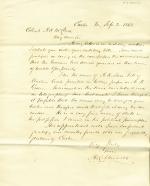
Henry D. Maxwell writes a letter to Colonel Alexander K. McClure informing him of a possible spelling error in the name of a military officer, whom he praises. "I see the name of A. L. Seem MD of Martin’s Creek printed in todays paper as A.
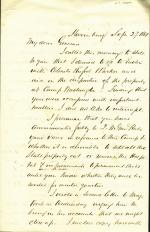
Henry D. Maxwell writes a series of letters to Governor Andrew G. Curtin regarding military administrative duties, including "the disposition of the property at Camp Washington" as well as making payments to soldiers.

John Linn writes thirteen letters to Eli Slifer, Secretary of the Commonwealth during the Civil War, regarding the organization of regiments for military campaigns, recommendations of officers for new positions in the Union army, the Milton Cornet

John Linn writes Governor Andrew Curtin to request that he hold off on appointing William Harding of Snyder County as one of the commissioners. Transcript included.
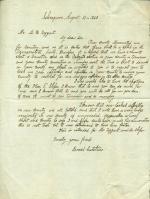
Israel Gutelius asks M. N. Taggart for help to secure Gutelius' nomination for Senator in the upcoming election.

Israel Gutelius writes James Sellers regarding his political activism in the Pennsylvania Senate and discusses other political issues.

Jacob G.
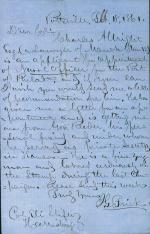
Jacob G.

M. Chamberlin writes Eli Slifer, the Secretary of the Commonwealth, to recommend the Hon. F. Gearhart as a chaplain for the Union army.
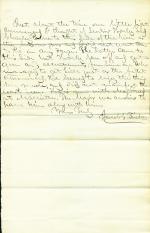
Union officer Jacob G. Frick describes how two soldiers (Harley Palmer and Charley Palmer) without any weapons reacted during a military engagement.

Jacob G. Frick writes a memorandum to A. L. Russell, Adjutant General of Pennsylvania, that lists the field and staff officers submitted for the Pennsylvania Regiment Militia. Transcript included.

Dr. Theodore Christ writes six letters to Eli Slifer, the Secretary of the Commonwealth under Governor Andrew Curtin, regarding his experience as a doctor in the Union Army during the Civil War.
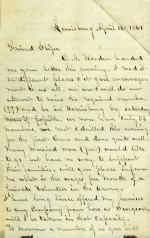
Dr. Theodore S. Christ writes eleven letters to Eli Slifer, the Secretary of the Commonwealth under Governor Andrew Curtin, regarding the organization of volunteer companies and daily life in a Union Army infantry company during the Civil War.
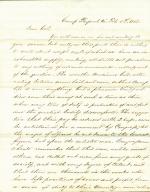
Thomas Chamberlin writes eleven letters to Eli Slifer, the Secretary of the Commonwealth under Governor Curtin, regarding life in the camp of a Union Army company during the Civil War.
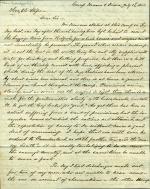
Union officer Thomas Chamberlin writes twelve letters to Eli Slifer, the Secretary of the Commonwealth under Governor Andrew Curtin, regarding his experience leading his company in the Union Army during the Civil War.

R. H. Chamberlin asks Eli Slifer, the Secretary of the Commonwealth under Governor Andrew Curtin, for help in forwarding a letter from Bucknell University Professor Thomas Curtis to Curtis' brother in South Carolina during the Civil War.

Jacob C.

Captain Everard Bierer writes a series of twelve letters to Eli Slifer, the Secretary of the Commonwealth under Governor Andrew Curtin, regarding the assembly and movement of army troops, the transportation of said troops, and requests for promoti
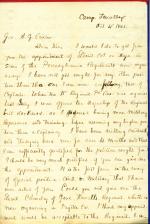
Everard Bierer writes Pennsylvania Governor Andrew Curtin to request the appointment as a Lieutenant Colonel or a Major "in some of the Pennsylvania Regiments now organizing." Bierer claims that he has been "drilling constantly and studying hard n

Thomas William Dick writes four letters to family members describing his experience as a soldier in the Union Army during the Civil War.
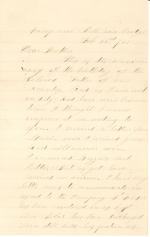
Thomas William Dick writes four letters to his brother and sister describing his experience as a soldier in the Union Army during the Civil War.

Thomas William Dick writes a five letters to his family describing his experience as a soldier of the Union Army during the Civil War. He describes in detail the battles he has fought in, and discusses the relative strengths of army leaders.
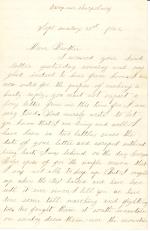
Thomas William Dick writes two letters to his family describing his experience as a soldier of the Union Army during the Civil War.

Thomas William Dick writes five letters to his family describing his experience as a soldier in the Union Army during the Civil War. Dick discusses daily life in the military camp, in addition to his own thoughts on the war.